Mike Inderlin: Turning Personal Struggle into Team Strength

By Kayla Riemensperger, Swimming World College Intern.
Do you ever wonder how your swim team came to be? Every great team is born from a person with a dream and a passion to share it with others. Typically, this person is the coach who plays a powerful role in steering the direction of the team.
Though coaches play a large role in their athletes’ development, some can lose sight of where swimming should fit in their lives. It can be easy for coaches, parents and swimmers alike to lose sight of why they got into swimming in the first place.
This is where the story of Mike Inderlin enters the picture. Read on to find out how a young man took his scarring experience as an athlete to create and coach a team unlike any other before it.
The Makings of a Young Athlete
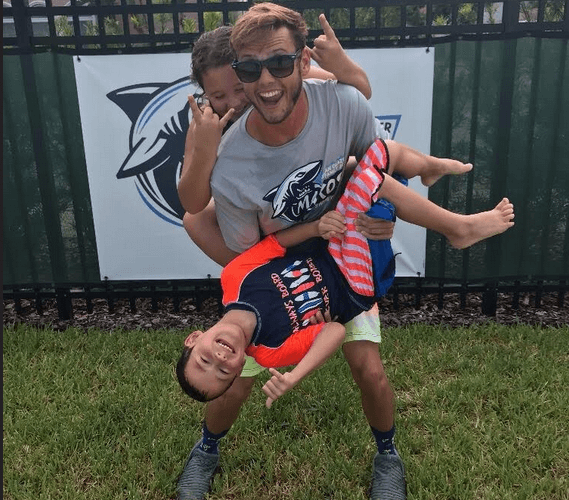
Photo Courtesy: Mike Inderlin
Mike Inderlin began his swimming journey at only a few weeks old: “Story has it my grandfather pushed me in at a pool party. Everyone freaked over the new baby while he exclaimed, ‘That’s how they learn.’ And I did.”
(Note: It is not recommended to teach children how to swim in this manner. Please use proper hands-on supervision to ensure safety.)
In addition to swimming, Inderlin kept busy with year-round sports, playing baseball in the fall and soccer in the spring. But to him, “they weren’t fun.” He remembers those sports as being both physically and psychologically exhausting: “I joke with people about how I suffer from PTSD.”
Inderlin’s father saw his son taking on the world through sports and forced him to continue, even when he begged to quit. His father didn’t understand what his son wanted, focusing only on what he desired for his kid instead. His father would even bribe him to practice for money at the age of six.
“I’d drift off for some peaceful laps and earn five dollars for a couple hours of work. Not bad for a 6-year-old,” Inderlin recalled. This started out as harmless incentive to swim laps and make some money; however, when it was finally time to try out for a real competitive team, everything changed. Inderlin realized at his first official practice that he hated swimming.
The Breaking Point
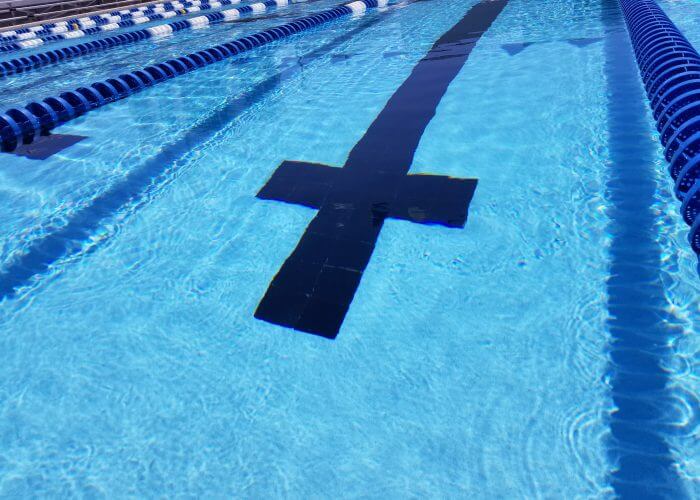
Photo Courtesy: Andy Ross
“I remember looking at the black line on the bottom of the pool just thinking, ‘This will be over soon, and I’ll never have to come to the horrible place again.’”
However, when he hopped into his parents’ van post-practice, he was met by his father’s huge smile and a, “So – how’d you like it, honey? You looked like you were having so much fun!” Inderlin, avoiding disappointing his father, lied and said, “Practice was fun.”
Throughout the next few years and a variety of club teams, Inderlin endured all sorts of emotionally scarring practices. He recalls coaches chucking kickboards at his head, calling him horrible names and verbally harassing him, to name a few. “At around the age of 14, I truly hated what my life was,” he says.
Because of the constant harassment and abuse at swim practice as well as parental pressure, Inderlin would have crushing anxiety about practice and performing to his father’s standards.
Living Up To Expectations
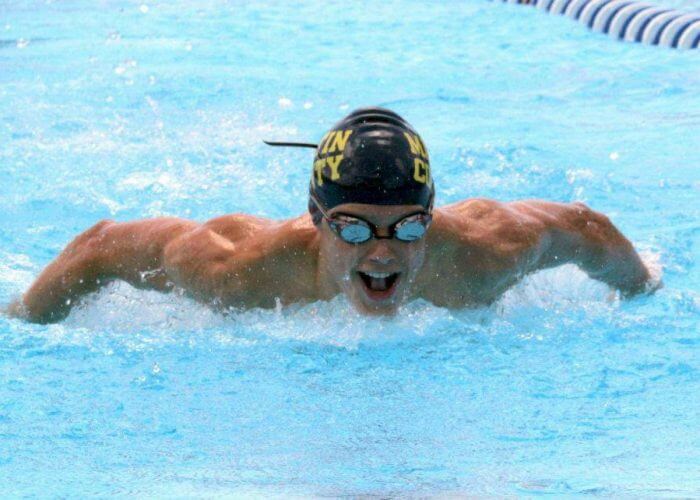
Photo Courtesy: Mike Inderlin
Inderlin’s father wanted his son to be a person that he simply was not. He set high standards for his son and expected him to follow through no matter what. With swimming, Inderlin wasn’t allowed to skip a single practice: His father forced him to go even if he was ill. “My dad was hard on me, with a lot of things,” Inderlin says.
He was also forced to be involved in a multitude of activities besides swimming. He had difficult chores that none of the other kids he knew had to do on weekends. There was no time for relaxation in life – for Inderlin, it was just go, go, go. When he earned his license and a car, he didn’t throw the normal celebration that most teens have. Instead, he realized that he would be driving himself to morning swim practice, doubles and sometimes even three workouts a day.
All of these factors added up to a negative relationship between Inderlin, his father and swimming.
Inderlin swam all through high school and was even voted a team captain; however, regardless of his swimming talent, he ended his career the first chance he could. He hung up his goggles after the last meet of his senior year, finally able to make a decision outside of his father’s control.
Due to Inderlin’s negative experience with the sport of swimming, he refused to ever touch the water again. That is, until he was able to reconcile his issues with the sport years later.
A New Beginning
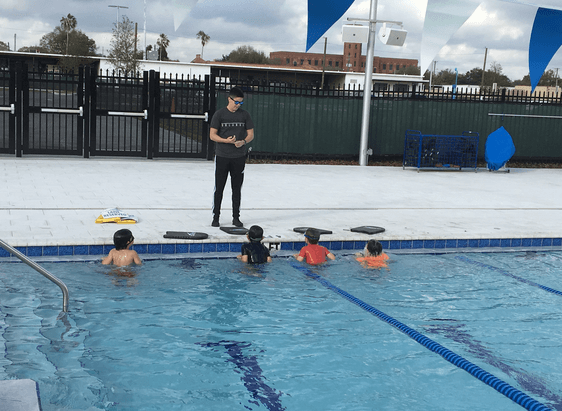
Photo Courtesy: Bryan Glazer Family JCC
At the age of 22 – a few years after ending his swimming career – Inderlin was given the opportunity to make amends with the sport. With a desire to share the sport of swimming in a new and uplifting way with other young swimmers, he formed the very first developmental swim team at the Bryan Glazer Family JCC location in Tampa, Florida.
This team, called the Makos Swim Club, contrasts with other competitive teams found across America today in that the focus of practice is on development and having fun over winning. It allows for young kids to learn about competitive swimming without all the blood, sweat, and tears shed after an intense practice with a less-than-empathetic coach.
Inderlin believes that the Makos developmental style team is “revolutionary for swimming, or any sport for that matter.” His philosophy focuses on children’s well-being and education, rather than running a program based on a computer-generated workout that leads to injury and burnout. If a coach truly cares about the athletes’ success, their psychological and physical well-being must be nurtured and maintained.
When working with his young athletes, Inderlin inquires if they’re having a good or bad day. When he finds out that one of his athletes is having a rough time, he gives them the extra encouragement needed to push through a workout. This style of coaching contrasts drastically with the rough style that Inderlin grew up with. By being compassionate towards his athletes, Inderlin is able to help them find their own love of the sport. He endeavors to foster a healthy relationship with sports.
If swimmers have an injury complaint, he stresses its severity to the parent or guardian rather than ignoring it. Because many athletes tend to brush off health issues until they hit a breaking point, Inderlin wants to take a proactive rather than reactive stance. A healthy swimmer is a happy swimmer and can continue athletic pursuits in the long term.
Inderlin believes that “if your philosophy in coaching isn’t for the absolute best interest of the child, then you are working for your own goals [rather than the swimmer’s].”
Coming Full-Circle
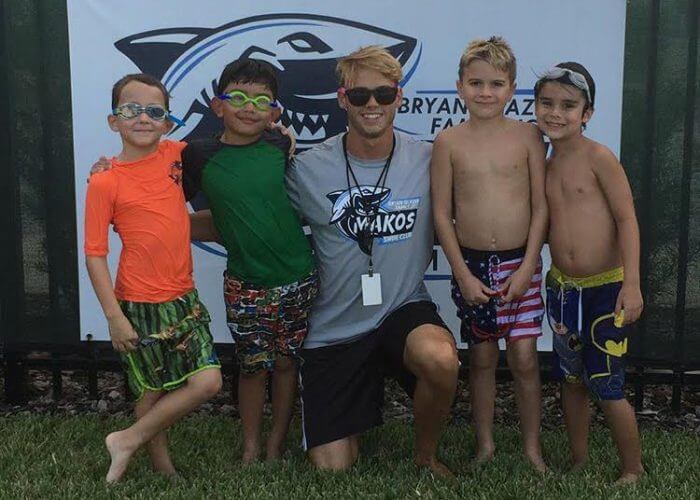
Photo Courtesy: Mike Inderlin
Though swimming has not always been a positive aspect of Inderlin’s life, his view of athletics has been redeemed through coaching and pushing for positive change in the sport. From working with the Makos Club, Inderlin has learned life balance and the bigger picture of athletic pursuits.
He learned that as a parent, there is a struggle between wanting your own kids to succeed and allowing them to make their own decisions. Succeeding should not come at the cost of a child’s well being. This is a struggle many parents face when involving their kids in sports, and Inderlin realizes that his father only wanted what was best for him – even if they didn’t always see eye to eye.
Inderlin also feels very strongly that “some children will be champions in swimming. But I know I am the light for some of these children who want to be a champion in something more [than athletics].”
This new style of coaching will hopefully help young swimmers find their own passion for the sport, fostering a life-long love for swimming rather than an anxiety-filled career of trying to live up to others’ expectations.
All commentaries are the opinion of the author and do not necessarily reflect the views of Swimming World Magazine nor its staff.




Great story. Very inspirational. Thanks for sharing.